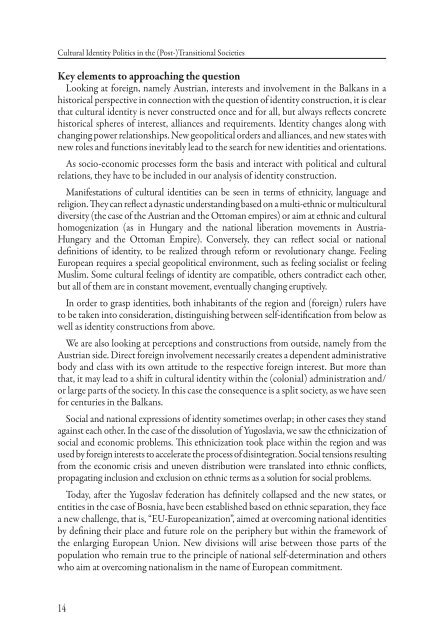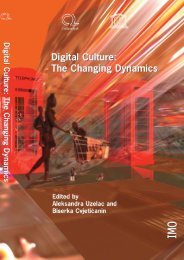free download in pdf format - Culturelink Network
free download in pdf format - Culturelink Network
free download in pdf format - Culturelink Network
You also want an ePaper? Increase the reach of your titles
YUMPU automatically turns print PDFs into web optimized ePapers that Google loves.
Cultural Identity Politics <strong>in</strong> the (Post-)Transitional Societies<br />
Key elements to approach<strong>in</strong>g the question<br />
Look<strong>in</strong>g at foreign, namely Austrian, <strong>in</strong>terests and <strong>in</strong>volvement <strong>in</strong> the Balkans <strong>in</strong> a<br />
historical perspective <strong>in</strong> connection with the question of identity construction, it is clear<br />
that cultural identity is never constructed once and for all, but always refl ects concrete<br />
historical spheres of <strong>in</strong>terest, alliances and requirements. Identity changes along with<br />
chang<strong>in</strong>g power relationships. New geopolitical orders and alliances, and new states with<br />
new roles and functions <strong>in</strong>evitably lead to the search for new identities and orientations.<br />
As socio-economic processes form the basis and <strong>in</strong>teract with political and cultural<br />
relations, they have to be <strong>in</strong>cluded <strong>in</strong> our analysis of identity construction.<br />
Manifestations of cultural identities can be seen <strong>in</strong> terms of ethnicity, language and<br />
religion. Th ey can refl ect a dynastic understand<strong>in</strong>g based on a multi-ethnic or multicultural<br />
diversity (the case of the Austrian and the Ottoman empires) or aim at ethnic and cultural<br />
homogenization (as <strong>in</strong> Hungary and the national liberation movements <strong>in</strong> Austria-<br />
Hungary and the Ottoman Empire). Conversely, they can refl ect social or national<br />
defi nitions of identity, to be realized through reform or revolutionary change. Feel<strong>in</strong>g<br />
European requires a special geopolitical environment, such as feel<strong>in</strong>g socialist or feel<strong>in</strong>g<br />
Muslim. Some cultural feel<strong>in</strong>gs of identity are compatible, others contradict each other,<br />
but all of them are <strong>in</strong> constant movement, eventually chang<strong>in</strong>g eruptively.<br />
In order to grasp identities, both <strong>in</strong>habitants of the region and (foreign) rulers have<br />
to be taken <strong>in</strong>to consideration, dist<strong>in</strong>guish<strong>in</strong>g between self-identifi cation from below as<br />
well as identity constructions from above.<br />
We are also look<strong>in</strong>g at perceptions and constructions from outside, namely from the<br />
Austrian side. Direct foreign <strong>in</strong>volvement necessarily creates a dependent adm<strong>in</strong>istrative<br />
body and class with its own attitude to the respective foreign <strong>in</strong>terest. But more than<br />
that, it may lead to a shift <strong>in</strong> cultural identity with<strong>in</strong> the (colonial) adm<strong>in</strong>istration and/<br />
or large parts of the society. In this case the consequence is a split society, as we have seen<br />
for centuries <strong>in</strong> the Balkans.<br />
Social and national expressions of identity sometimes overlap; <strong>in</strong> other cases they stand<br />
aga<strong>in</strong>st each other. In the case of the dissolution of Yugoslavia, we saw the ethnicization of<br />
social and economic problems. Th is ethnicization took place with<strong>in</strong> the region and was<br />
used by foreign <strong>in</strong>terests to accelerate the process of dis<strong>in</strong>tegration. Social tensions result<strong>in</strong>g<br />
from the economic crisis and uneven distribution were translated <strong>in</strong>to ethnic confl icts,<br />
propagat<strong>in</strong>g <strong>in</strong>clusion and exclusion on ethnic terms as a solution for social problems.<br />
Today, aft er the Yugoslav federation has defi nitely collapsed and the new states, or<br />
entities <strong>in</strong> the case of Bosnia, have been established based on ethnic separation, they face<br />
a new challenge, that is, “EU-Europeanization”, aimed at overcom<strong>in</strong>g national identities<br />
by defi n<strong>in</strong>g their place and future role on the periphery but with<strong>in</strong> the framework of<br />
the enlarg<strong>in</strong>g European Union. New divisions will arise between those parts of the<br />
population who rema<strong>in</strong> true to the pr<strong>in</strong>ciple of national self-determ<strong>in</strong>ation and others<br />
who aim at overcom<strong>in</strong>g nationalism <strong>in</strong> the name of European commitment.<br />
14



